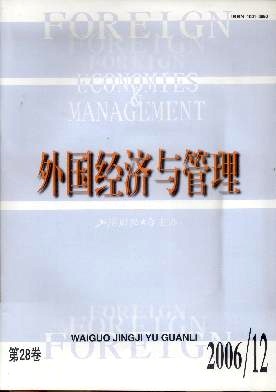组织内部信任理论研究述评
外国经济与管理 2006 年 第 28 卷第 12 期, 页码:1 - 9
摘要
参考文献
[1]Rousseau,D M,Sitkin,S B,Burt,R S,and Camerer,C.Not so different after all:a cross-discipline view of trust[J].Acad-emy of Management Review,1998,23(3):393-404.
[2]Mayer,R C,Davis,J H,and Schoorman,F D.An integrative model of organizational trust[J].Academy of ManagementReview,1995,20(3):709-734.
[3]Cook,J,and Wall,T.New work attitude measures of trust,organizational commitment and personal need non-fulfilment[J].Journal of Occupational Psychology,1980,53:39-52.
[4]McAllister,D J.Affect-and cognition-based trust as foundations for interpersonal cooperation in organizations[J].Acade-my of Management Journal,1995,38(1):24-59.
[5]郑伯曛.企业组织中的上下属信任关系[J].社会学研究,1999,(2):22-37.
[6]Costigan,R D,Ilter,S S,and Berman,J J.A multi-dimensional study of trust in organizations[J].Journal of Managerial Is-sues,1998,10(3):303-317.
[7]Chowdhury,S.The role of affect-and cognition-based trust in complex knowledge sharing[J].Journal of Managerial Is-sues,2005,17(3):310-326.
[8]Ganesan,S.Determinants of long-term orientation in buyer-seller relationships[J].Journal of Marketing,1994,58(4):1-19.
[9]Das,T K,and Teng,B S.Trust,control,and risk in strategic alliances:an integrated framework[J].Organization studies,2001,22(2):251-283.
[10]Farrell,J B et al.CEO leadership,top team trust and the combination and exchange of information[J].IrishJournal of Management,2005,26(1):22-40.
[11]McCauley,R C,and Kuhnert,K W.A theoretical review and empirical investigation of employee trust[J].Public Administration Quarterly,1992,(Sum.):265-285.
[12]Jarvenpaa,S L,Knoll,K,and Leidner,D E.Is anybody out there?antecedents of trust in global virtualteams[J].Journal of Management Information Systems,1998,14(4):29-64.
[13]Podsakoff,P M,MacKenzie,S B,and Bommer,W H.Transformational leader behaviors and substitutes forleadership as determinants of employee satisfaction,commitment,trust,and organizational citizenship be-haviors[J].Journal of Management,1996,22(2):259-298.
[14]Davis,J H et al.The trusted general manager and business unit performance:empirical evidence of a com-petitive advantage[J].Strategic Management Journal,2000,21:563-576.
[15]Tan,H H,and Tan,C S F.Toward the differentiation of trust in supervisor and trust in organization[J].Genetic,Social,and General Psychology Monographs,2000,126(2):241-260.
[16]Farh,J L,Tsui,A S,Xin,K,and Cheng,B S.The influence of relational demography and guanxi:the Chi-nese case[J].Organization Science,1998,9(4):471-488.
[17]Wong,Y T,Ngo,H Y,and Wong,C S.Antecedents and outcomes of employees’trust in Chinese jointventures[J].Asia Pacific Journal of Management,2003,20(4):481-499.
[2]Mayer,R C,Davis,J H,and Schoorman,F D.An integrative model of organizational trust[J].Academy of ManagementReview,1995,20(3):709-734.
[3]Cook,J,and Wall,T.New work attitude measures of trust,organizational commitment and personal need non-fulfilment[J].Journal of Occupational Psychology,1980,53:39-52.
[4]McAllister,D J.Affect-and cognition-based trust as foundations for interpersonal cooperation in organizations[J].Acade-my of Management Journal,1995,38(1):24-59.
[5]郑伯曛.企业组织中的上下属信任关系[J].社会学研究,1999,(2):22-37.
[6]Costigan,R D,Ilter,S S,and Berman,J J.A multi-dimensional study of trust in organizations[J].Journal of Managerial Is-sues,1998,10(3):303-317.
[7]Chowdhury,S.The role of affect-and cognition-based trust in complex knowledge sharing[J].Journal of Managerial Is-sues,2005,17(3):310-326.
[8]Ganesan,S.Determinants of long-term orientation in buyer-seller relationships[J].Journal of Marketing,1994,58(4):1-19.
[9]Das,T K,and Teng,B S.Trust,control,and risk in strategic alliances:an integrated framework[J].Organization studies,2001,22(2):251-283.
[10]Farrell,J B et al.CEO leadership,top team trust and the combination and exchange of information[J].IrishJournal of Management,2005,26(1):22-40.
[11]McCauley,R C,and Kuhnert,K W.A theoretical review and empirical investigation of employee trust[J].Public Administration Quarterly,1992,(Sum.):265-285.
[12]Jarvenpaa,S L,Knoll,K,and Leidner,D E.Is anybody out there?antecedents of trust in global virtualteams[J].Journal of Management Information Systems,1998,14(4):29-64.
[13]Podsakoff,P M,MacKenzie,S B,and Bommer,W H.Transformational leader behaviors and substitutes forleadership as determinants of employee satisfaction,commitment,trust,and organizational citizenship be-haviors[J].Journal of Management,1996,22(2):259-298.
[14]Davis,J H et al.The trusted general manager and business unit performance:empirical evidence of a com-petitive advantage[J].Strategic Management Journal,2000,21:563-576.
[15]Tan,H H,and Tan,C S F.Toward the differentiation of trust in supervisor and trust in organization[J].Genetic,Social,and General Psychology Monographs,2000,126(2):241-260.
[16]Farh,J L,Tsui,A S,Xin,K,and Cheng,B S.The influence of relational demography and guanxi:the Chi-nese case[J].Organization Science,1998,9(4):471-488.
[17]Wong,Y T,Ngo,H Y,and Wong,C S.Antecedents and outcomes of employees’trust in Chinese jointventures[J].Asia Pacific Journal of Management,2003,20(4):481-499.
引用本文
宝贡敏, 徐碧祥. 组织内部信任理论研究述评[J]. 外国经济与管理, 2006, 28(12): 1–9.
导出参考文献,格式为:
下一篇:西方组织犬儒主义研究探析





 6955
6955  0
0

